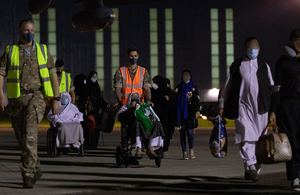Thank you Mr President. Let me also offer the UK’s condolences for all those who lost their lives in today’s terrorist attack in Kabul.
I thank the Secretary-General for his briefing. You describe a desperate situation, and it is right this Council considers how it can help. So I would like to make three points in response to what we have heard.
First, all parties must cease hostilities and unfettered humanitarian access must be provided to relieve the toll of this conflict on ordinary Ethiopians.
As the Secretary General told us, over 400,000 people in Tigray are experiencing famine conditions. That is more than in the rest of the world combined.
Only a fraction of the 100 trucks of aid required every day are getting into Tigray. Banking, electricity and communications services remain suspended, posing serious obstacles to humanitarian operations.
The spread of fighting into neighbouring Amhara and Afar states, displacing tens of thousands of civilians, will only extend the human suffering and prolong the conflict. We therefore call on Tigrayan forces to immediately cease fighting in Amhara and Afar.
We reiterate that Eritrean troops must withdraw completely from Ethiopia, as the Government of Ethiopia has requested. And we call upon the Ethiopian Government to fully enable humanitarian access. That includes removing bureaucratic barriers to aid delivery and allowing sufficient cash and fuel into Tigray to enable humanitarian operations.
Secondly, Mr President, I want to emphasise the need for all parties to ensure the protection of civilians and to comply with international humanitarian and human rights law. The Secretary-General’s briefing gave further weight to the reports we have been receiving of atrocities from all sides. These include brutal and systematic sexual violence, massacres, and indiscriminate shelling of towns. We have also witnessed an increase in hate speech and attacks on the humanitarian community.
The United Kingdom fully supports the joint investigation by the UN Office for the High Commissioner of Human Rights and the Ethiopian Human Rights Commission. It is crucial to prospects for peace and reconciliation that this investigation is thorough and robust. And perpetrators of atrocities must be held to account.
Thirdly, Mr President, let me underline the urgency of pursuing political dialogue to end this crisis. The United Kingdom is a longstanding friend and partner of Ethiopia. We have been proud to work alongside Ethiopians to support their progress in reducing poverty and building sustainable economic growth. This conflict is already reversing that progress. It now threatens the long term stability and prosperity of the country and of the region.
We want to see Ethiopia return to a positive trajectory. Ten months in it is clear there is no military solution to this conflict. The only way that Ethiopia can return to peace and prosperity is through an inclusive political settlement. That requires talks between the parties – urgently, and without preconditions.
We support the efforts of the Secretary General and Under Secretary-General Griffiths and by the Africa Union to make this possible, and we therefore welcome the announcement today of the appointment of former President Obasanjo as AU Special Representative for the Horn of Africa.
Mr President, it is abundantly clear what the parties need to do now to end the dreadful toll of human suffering in Ethiopia.
The United Kingdom joins the Secretary-General and other members of this Council in calling on all parties to cease hostilities, allow unfettered humanitarian access, comply with international law, and begin a process of dialogue to resolve the conflict.
Thank you, Mr. President.

